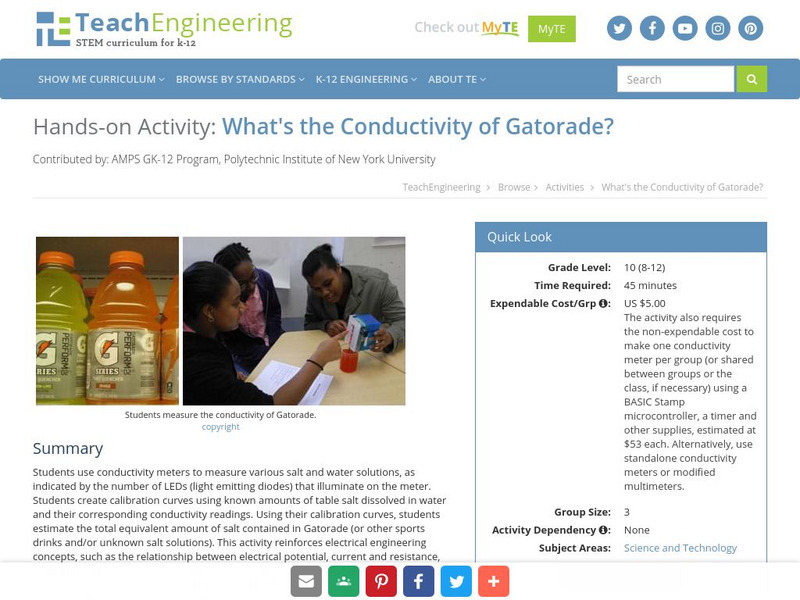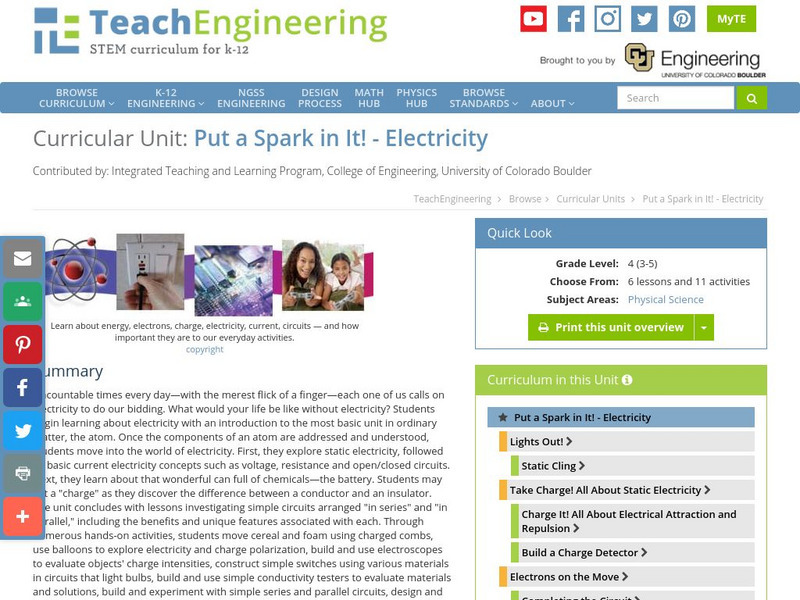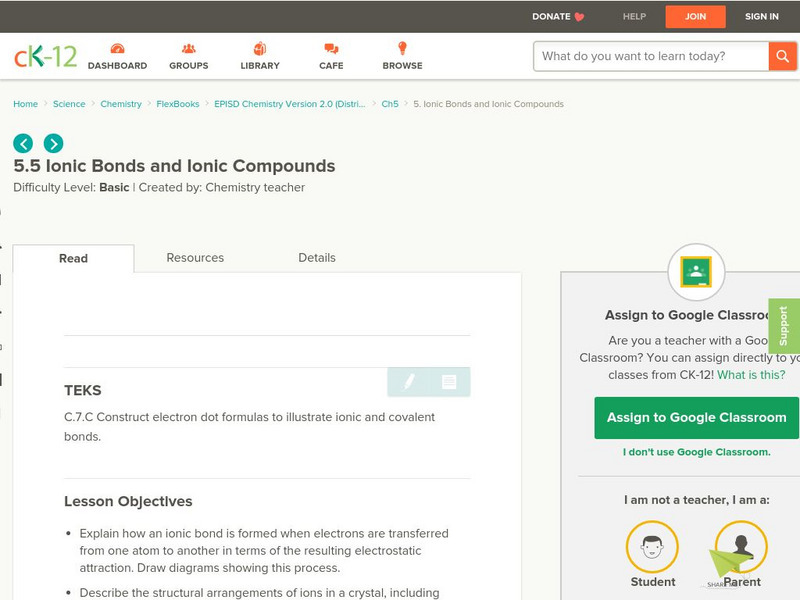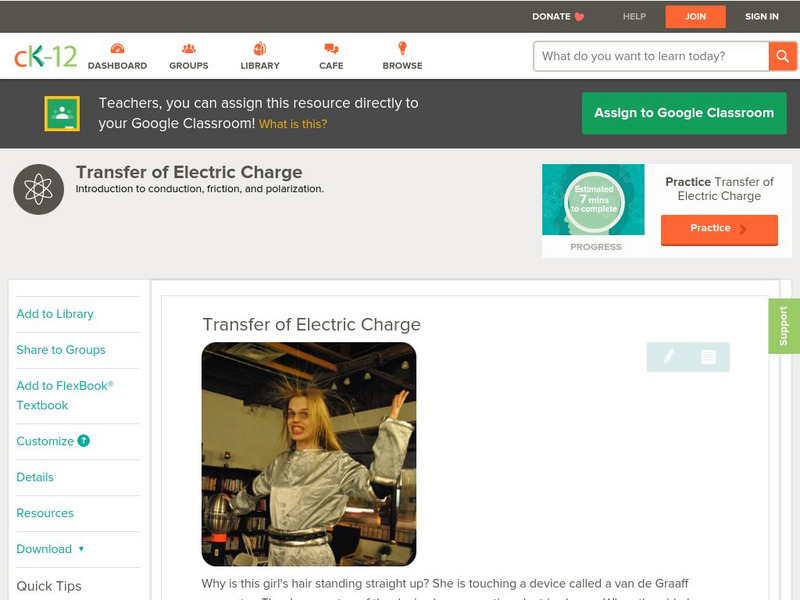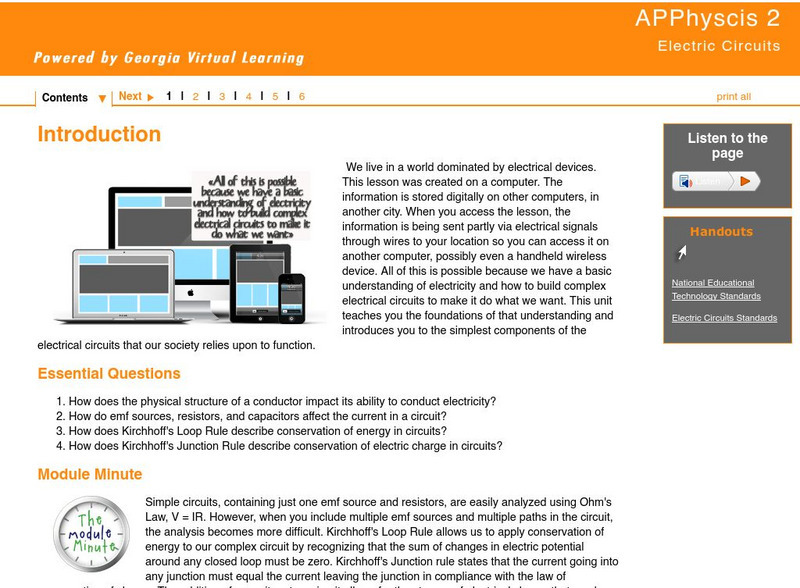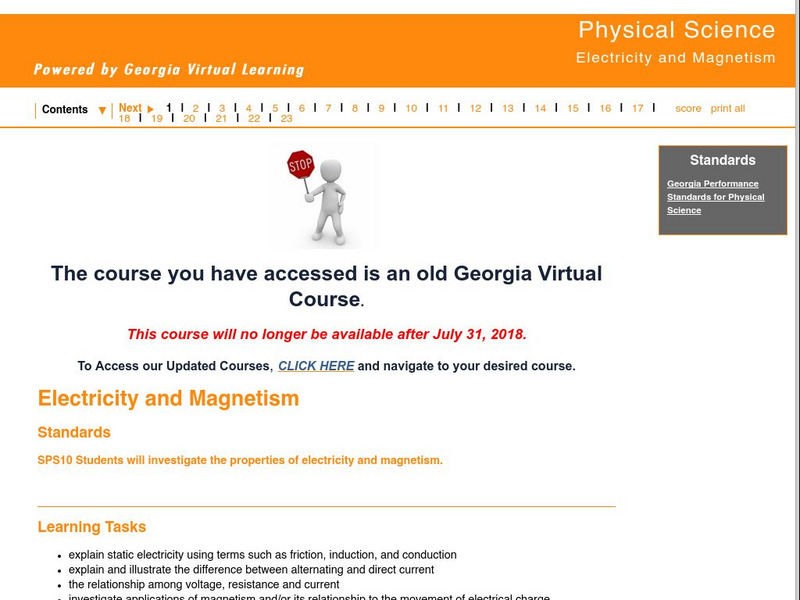American Geosciences Institute
American Geosciences Institute: Earth Science Week: Mineral Electrical Conductivity
The purpose of this activity is to test the conductivity of various minerals with a simple electrical circuit and draw conclusions about which ones would be used in electronics.
Science Education Resource Center at Carleton College
Serc: Investigating Testing for Electrical Conductivity Using Materials
In this activity, students will understand that electricity moves through different circuits and discover what types of materials are conductors and insulators.
TeachEngineering
Teach Engineering: Will It Conduct?
Students build their own simple conductivity tester and explore whether given solid materials and solutions are good conductors of electricity.
Wikimedia
Wikipedia: Electrical Conductivity
This is the encyclopedic entry for electrical conductivity from Wikipedia.com. The site provides a brief introduction to the topic but provides numerous links to information relative to the topic.
Science Education Resource Center at Carleton College
Serc: Conductivity of Water
Students discover that pure water does not conduct electricity and that dissolving different substances in water may or may not cause it to conduct electricity.
Science is Fun
Science Is Fun: Conducting Solutions
An experiment where one must first build a conductivity tester, then use it to test how well water conducts electricity when different materials found around the home are each dissolved in it.
TeachEngineering
Teach Engineering: What's the Conductivity of Gatorade?
Students use conductivity meters to measure various salt and water solutions, as indicated by the number of LEDs (light emitting diodes) that illuminate on the meter. Students create calibration curves using known amounts of table salt...
Canada Science and Technology Museum
Canada Science and Technology Museum: Background Information for Electricity
The Canada Science and Technology Museum answers some of the most common questions about electricity. For example, get the definition of electricity, the difference between alternating and direct currents, and learn how a fuse works.
TeachEngineering
Teach Engineering: Put a Spark in It! Electricity
Uncountable times every day "with the merest flick of a finger"each one of us calls on electricity to do our bidding. What would your life be like without electricity? Students begin learning about electricity with an introduction to the...
TeachEngineering
Teach Engineering: Should I Drink That?
Students perform the first steps that environmental engineers do to determine water quality - sampling and analysis. Student teams measure the electrical conductivity of four water samples using teacher-made LED conductivity testers and...
CK-12 Foundation
Ck 12: Ionic Bonds and Ionic Compounds
[Free Registration/Login may be required to access all resource tools.] In the following online tutorial students will learn to explain how an ionic bond is formed when electrons are transferred from one atom to another in terms of the...
Pennsylvania State University
Applied Physics: Model Analysis of an Electric Guitar
Great site explores the physics behind an electrical guitar. Outlines process for conducting an experiment on sound vibrations and provides animated GIF movies showing the first five modes of vibration.
Other
Bsi Education: Electrical Properties
The Applied Science resource consists of practical activities that demonstrate the importance of standard procedures in scientific work. Students examine electrical properties through a variety of activities. Some topics investigated are...
CK-12 Foundation
Ck 12: Physical Science: Transfer of Electric Charge
[Free Registration/Login may be required to access all resource tools.] Transfer of electric charge: transfer of electrons, conservation of charge and three ways electric charge can be transferred.
Maryland Science Center
Maryland Science Center: Build a Conductivity Tester [Pdf]
Instructions on how to build an instrument that can be used to test which materials are conductors and which are insulators, in order to bridge a gap in an electrical circuit.
Physics Classroom
The Physics Classroom: Static Electricity: Charging Interactive
Explore charge interactions, the charging of objects by conduction and induction, and the grounding of objects in this interactive.
CK-12 Foundation
Ck 12: Electric Conductors and Insulators
[Free Registration/Login may be required to access all resource tools.] In this lesson, students learn about materials that conduct electricity and those that insulate against it. Includes a simulation for exploring conductivity, and a...
National High Magnetic Field Laboratory
Magnet Academy: Joseph John Thomson
Joseph John Thomson, better known as J. J. Thomson, was a British physicist who first theorized and offered experimental evidence that the atom was a divisible entity rather than the basic unit of matter, as was widely believed at the...
Georgia Department of Education
Ga Virtual Learning: Ap Physics 2: Electric Circuits
This unit teaches students the foundations of electrical circuits and introduces them to their simplest components. Covers series and parallel circuits, Kirchhoff's Rules, Ohm's Law, RC circuits, resistivity, and capacitance.
Georgia Department of Education
Ga Virtual Learning: Physical Science: Electricity and Magnetism
Students learn about static electricity using terms such as friction, induction, and conduction. They also explain and illustrate the difference between alternating and direct current, and understand the relationship among voltage,...
Wolfram Research
Wolfram Science World: Eric Weisstein's World of Physics: Electrical Conduction
A brief definition for what electrical conduction is. Also provides the definition for related terms.
TeachEngineering
Teach Engineering: Conductivity
Students make a simple conductivity tester using a battery and light bulb. They learn the difference between conductors and insulators of electrical energy as they test a variety of materials for their ability to conduct electricity.
Science Struck
Science Struck: Why Do Citrus Fruits Conduct Electricity?
Discover what it is about citrus fruits that enable them to conduct electricity, then make your own citrus fruit battery using the instructions given here.
Science Buddies
Science Buddies: Which Materials Are the Best Conductors?
There are two main types of materials when it comes to electricity, conductors, and insulators. What are they made of? Find out by testing different materials in a circuit to see which ones conduct the most electricity.






